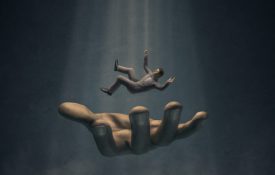-
Brains Make Decisions the Way Alan Turing Cracked Codes
Smithsonian Magazine: Despite the events depicted in The Imitation Game, Alan Turing did not invent the machine that cracked Germany’s codes during World War II—Poland did. But the brilliant mathematician did invent something never mentioned in the film: a mathematical tool for judging the reliability of information. His tool sped up the work of deciphering encoded messages using improved versions of the Polish machines. Now researchers studying rhesus monkeys have found that the brain also uses this mathematical tool, not for decoding messages, but for piecing together unreliable evidence to make simple decisions.
-
The Internet’s hidden science factory
PBS: In a small apartment in a small town in northeastern Mississippi, Sarah Marshall sits at her computer, clicking bubbles for an online survey, as her 1-year-old son plays nearby. She hasn’t done this exact survey before, but the questions are familiar, and she works fast. That’s because Marshall is what you might call a professional survey-taker. In the past five years, she has completed roughly 20,000 academic surveys. This is her 21st so far this week. And it’s only Tuesday. Marshall is a worker for Amazon’s Mechanical Turk, an online job forum where “requesters” post jobs, and an army of crowdsourced workers complete them, earning fantastically small fees for each task.
-
The Perils of Adolescence
Adolescence is a perilous time of life. It’s a time of heightened risk taking—reckless driving, risky sex, excessive drug and alcohol use. For decades the prevalent view—the common wisdom of parenting manuals—was that teenagers feel invulnerable, immortal. They simply perceive less peril in dicey situations, and believe they have much more control than they actually do. In short, they underestimate life’s very real risks and dangers. But scientists who study adolescent decision making now dispute this common parenting wisdom. Teenagers do indeed underestimate risk—sometimes—but at other times they overestimate how risky and harmful a situation is.
-
Are Corporations People, Too? Your Brain Seems to Process Them That Way
According to rulings from the U.S. Supreme Court, corporations are people, at least when it comes to certain legal rights such as free speech. While corporations may be people in the eyes of the law, a team of psychological scientists recently investigated whether corporations also register as people in the brain. Researchers Mark Plitt, Ricky Savjani, and David Eagleman of Baylor College of Medicine utilized neuroimaging technology to determine whether people unconsciously perceive corporations as inanimate objects or as people. “Little is known about how our brains process information about collective units such as corporations,” the researchers write in the journal Social Neuroscience.
-

Thinking of God Makes People Bigger Risk-Takers
Reminders of God can make people more likely to seek out and take risks, according to research published in Psychological Science, a journal of the Association for Psychological Science. The findings suggest that people are
-

Simple Maze Test Could Help Identify Drivers’ Accident Risk
A simple 3-minute test may accurately identify older drivers who are at heightened risk of serious accidents because of cognitive decline.

